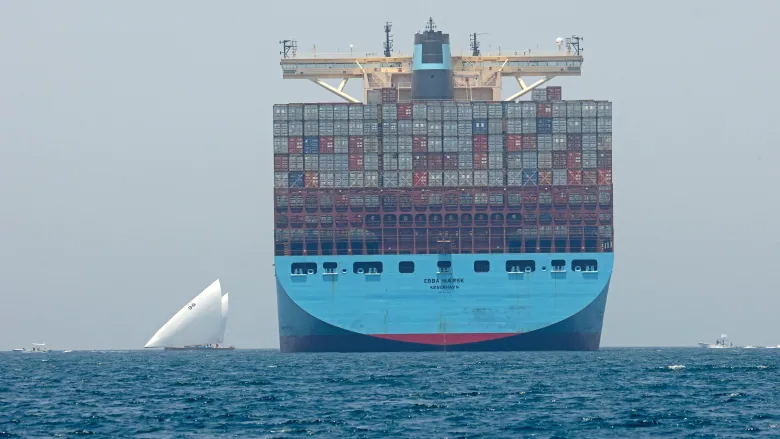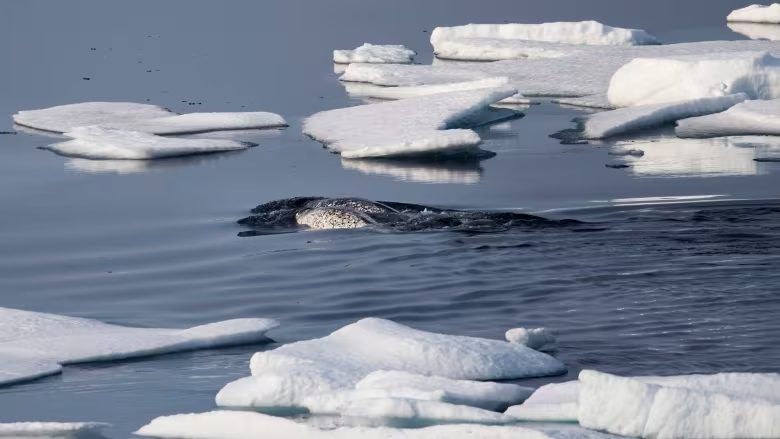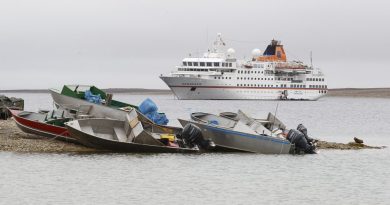Inuit work towards greater voice in shipping as IMO meeting gets underway

As an International Maritime Organization (IMO) Sub-committee meeting on ship construction got underway in London on Monday, the Inuit Circumpolar Council (ICC) says it will continue to work towards Inuit having a greater voice in shipping.
“For generations, our communities have thrived in balance with the Arctic environment,” Lisa Koperqualuk, the ICC Vice Chair, and head of delegation at the IMO, said in a statement on Monday.
“As our homeland faces unprecedented changes, it’s crucial that Inuit Knowledge and stewardship practices are incorporated into international maritime regulations and governance to protect our way of life.”
On Monday, ICC said its strategy for greater Inuit involvement in the IMO includes the incorporation of Indigenous knowledge in its work, a call for a 50 per cent reduction in greenhouse gas by the shipping industry and protection of the Arctic environment.
“Through our advocacy at the IMO, the ICC will champion the rights and well-being of Inuit, highlighting the importance of Indigenous Knowledge in global environmental governance,” ICC Chair Sara Olsvig said
Tackling underwater noise
The reduction of underwater noise pollution is one of the topics at this week’s IMO meeting, an issue also part of the ICC strategy.
Underwater noise can be produced by everything from ship propellers to the form of a boat’s hull to on-board machinery.
The effect of noise on marine life has become an increasing concern in some Inuit communities.
The Arctic Council, comprising eight Arctic countries and six Indigenous groups, has reported on the impact of underwater noise on species like whales, Arctic cod, and shorthorn sculpin, and Inuit communities, particularly on Canada’s Baffin Island, have raised alarms about increased shipping affecting marine mammals like narwhal.
The International Maritime Organization (IMO) approved guidelines in 2014 to address commercial shipping noise.

The guidelines give recommendations for shipbuilders and operators, covering hull and propeller design, standardized noise measurement, and strategic placement of on-board machinery to mitigate underwater noise.
However, ICC has previously said the progress has been slow due to their voluntary nature.
“The ICC proposes aggressive measures to reduce and eliminate pollution such as black carbon emissions which increase local warming and ice melt, along with discharges of greywater and the use of scrubbers that dump toxic effluent in important ocean areas,” ICC said in their Monday statement.
“Additionally, the ICC seeks to halve underwater radiated noise from ships by 2030, addressing a critical concern for Inuit communities reliant on marine ecosystems for well-being and livelihoods.”
Working towards greater voice at IMO
ICC is also aiming for full consultative status at the IMO. It has had provisional consultative status in 2021.
“The ICC is seeking full consultative status at the IMO by 2025, aiming to ensure Inuit voices are integral in decision-making processes, particularly in acknowledging how global matters impact the Arctic region of Inuit Nunaat and vice-versa,” the organization said.
“This status will enable the ICC to offer direct input into IMO regulations, reflecting the unique needs and perspectives of Inuit communities.
The IMO meeting runs until Jan. 26.
ICC represents the approximately 180,000 Inuit in Alaska, Canada, Greenland, and Chukotka, Russia.
Comments, tips or story ideas? Contact Eilís at eilis.quinn(at)cbc.ca
Related stories from around the North:
Canada: Canada comes out in favour of heavy fuel oil ban in Arctic, Eye on the Arctic
Finland: Finland investigates oil leak risks from Baltic Sea shipwrecks, Yle News
Greenland: Arctic Council report analyzes flag states and legal obligations in Arctic shipping, Eye on the Arctic
Iceland: Iceland to restrict heavy fuel oil use in territorial waters, Eye on the Arctic
Norway: LNG-reloading operations end in Norway’s Arctic waters, The Independent Barents Observer
Russia: Shipping figures rising on Russia’s Northern Sea Route, The Independent Barents Observer
United States: Carnival Corporation ships switch to cleaner fuel on Arctic cruises, Radio Canada International



